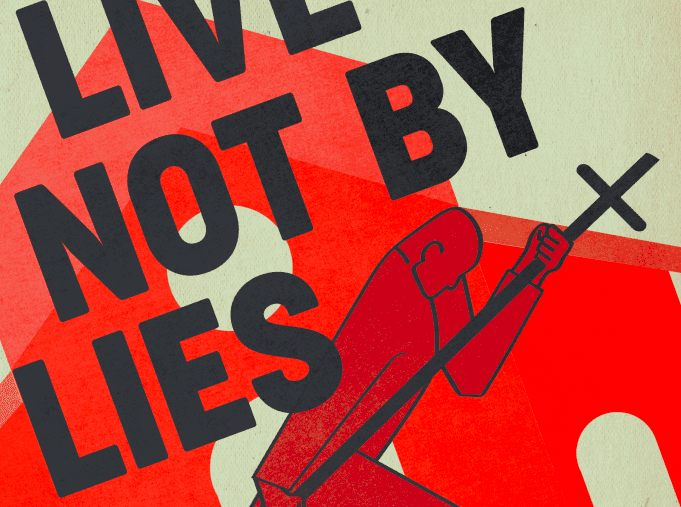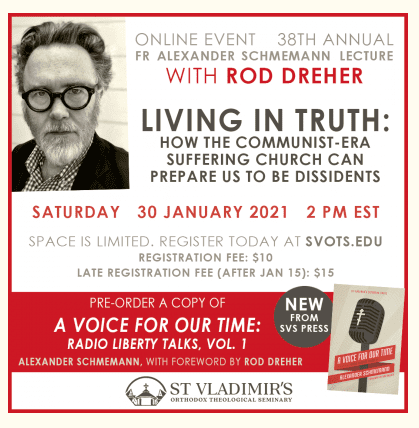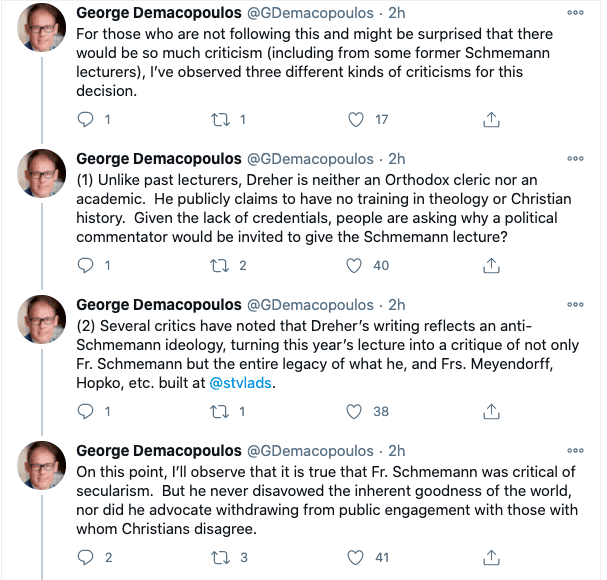The Orthodox Left Wails

This week, St. Vladimir’s Orthodox Seminary made this announcement:

Here is more information, including a form to register for the livestream. I won’t be traveling for this — it will be entirely online — but places for the livestream are limited.
This is an incredible honor for me, as an Orthodox Christian and reader of Father Schmemann. This lecture is usually delivered by an eminent churchman or an academic. I am a layman and a mere journalist. I am grateful to St. Vladimir’s rector Father Chad Hatfield and to others at the seminary for their confidence that I have something important to say to the Orthodox theological community. My lecture, of course, will be based on my bestselling book Live Not By Lies, which continues to sell like gangbusters.
It is no surprise that the Orthodox theological left in this country is wailing and gnashing its teeth over the announcement. I have made it my business for almost a decade to keep my snout out of Orthodox church politics, so I don’t follow the discussion on social media or elsewhere, but I am told by readers that the Orthodox left believes that inviting a louse like me to give this lecture is trampling on the Holy of Holies. When a friend e-mailed me this thread by a Greek Orthodox professor at Fordham, I literally laughed out loud:



Golly. Let me answer these comments specifically, but then tell you readers who are outside the very small world of American Orthodoxy what’s going on.
- Dreher has no credentials. Can’t even put ‘Doctor’ in front of his name. Well, they’ve got me there. On the other hand, I’ve written two New York Times bestselling books of cultural analysis from a Christian perspective, for the popular reader. The Benedict Option has been translated into twelve languages. Live Not By Lies is in the process of being translated into six, I think, and we expect more. Clearly, a lot of people think I have something worth listening to.
- I wouldn’t even know what an “anti-Schememann ideology” is. In no way do I deny the “inherent goodness of the world.” Where do these nuts get this? Not from reading my books. Moreover, they’ve got their nose out of joint not because I won’t talk to people who disagree with me. They’re mad because I won’t talk to them, and I encourage other actually orthodox Orthodox to avoid these phony dialogues. Many of these people apparently want to turn Orthodoxy into Greco-Slavic Episcopalianism (especially on the issue of LGBT). People who came to Orthodox from the Mainline Protestant churches, or from the Catholic Church (as I did), understand quite well the process of “dialogue” here. It’s a shopworn but effective strategy of the theological and moral left, by which they seek to get a foothold within church institutions and parishes, claiming that they’re only interested in talking about issues. Once the institution (parish, whatever) has legitimated their heterodoxy as a valid point of view, the battle is lost. These people will not stop until they have transformed the institution in their image, at which point the “dialogue” ends, and it becomes a matter of justice to silence the conservatives. I advise actually orthodox Orthodox not to walk into that trap.
- The sacramentality of the world is the antithesis of Dreher’s point of view. This is crazy. The only people who can say that are those who have not read my books. It is quite common to find people — usually of the theological left, but sometimes on the right as well — who have not read my books at all, but are sure they know what I’m saying, and that it is WRONG and DANGEROUS.
- Live Not By Lies is a political statement. Wrong. It’s about theology, economics, politics, technology, and culture. This is an attempt by this ideological tribe to dismiss what I have to say as a species of conservative politics. Again, these are not people who have read Live Not By Lies, and therefore, I don’t take them seriously.
What’s going on here, more broadly? Well, I have no idea why, specifically, the seminary invited me to give this talk, but I can make an informed guess.
The seminary is training priests and teachers to serve the Orthodox Church in the 21st century. It naturally wants them not only to understand the contemporary world (which is post-Christian, but also to equip them to disciple people faithfully, within Orthodox doctrine and tradition.
Live Not By Lies is a book whose genesis was in the warnings of emigre Christians who grew up in the Soviet Union, or in one of the nations of Central Europe that it held captive. They sense something similar to what they left behind rising here in the West — a totalitarian mindset that is conquering the institutions our society, and the modern mind. It’s not going to be Stalinism 2.0, but they are certain that it will be in some real sense totalitarian.
The first half of my book identifies the nature of the threat, and talks in part about identity politics, woke capitalism, technology, and “the Myth of Progress” as all being threatening to Christian fidelity, to the truth, and to religious liberty. The second half of the book is composed of testimonies from Orthodox Christians, as well as Catholics and Protestants, from that world, who lived through the totalitarian nightmare. They offer advice for what Christians today should do to prepare ourselves to identify the dangers, and to build resistance. At no point does anybody recommend voting for the Republican Party. Rather, this is about organizing prayer groups, and networks of dissidents, about educating our families for resistance, about living counterculturally, and most of all, preparing ourselves to suffer for Christ.
Why would Orthodox Christians like these theological lefties oppose this? Because the book implicitly identifies them as the problem.
The big project of many of these people is normalizing LGBT and gender ideology within the Orthodox Church. George Demacopoulos, for example, is one of the directors of the Orthodox Studies Center at Fordham, the Jesuit university. Here’s one of the big initiatives the center is highlighting now:

Read more about it here. This is one of those phony “dialogue” things. You may be quite certain that Fordham does not host an Orthodox Studies Center interested in finding out how to defend and to live out traditional Orthodox teachings on sex and sexuality in the modern world. I don’t know where the Orthodox Studies Center stands on the matter of identity politics, but I doubt very much that the people who are shouting loudest for me to be disinvited to St. Vladimir’s are people who are prepared to tolerate a point of view that opposes identity politics, especially from a Christian perspective. (Live Not By Lies talks about how identity politics advocates think and act in ways that parallel Bolshevik patterns.)
The point is, there is no escape from these battles in the world, certainly not in the Orthodox Church. Last week an Orthodox laywoman wrote to say that her priest is telling their parish, especially the young, that Orthodoxy should update itself to modernity, and embrace same-sex marriage and the rest. This is a priest, in a large parish (I looked it up). This is not common, to the best of my knowledge, but it’s not as rare as it should be. My estimation is that many priests and leaders within the Orthodox Church would rather this whole issue go away. It’s not going away — and the clergy cannot always be counted on to teach and disciple others in faithful Orthodoxy.
My guess is that St. Vladimir’s Orthodox Theological Seminary wishes to inform its students of the greatest challenges to Orthodoxy in this modern world, and set them to thinking of what they can and should do to prepare themselves and their flocks to be faithful in what is sure to be a very trying time. My guess too is that St. Vladimir’s, as the heir to a church that suffered horribly under the totalitarian Communist yoke, appreciates the warnings that Slavic Christians and others who know about this suffering firsthand are sounding to the rest of us. And the seminary, in keeping with the spirit of Father Schmemann, who had a gift for communicating to broad audiences, in language they could understand, might well appreciate that an Orthodox journalist (me) amplifies the voices of Orthodox men like Alexander Ogorodnikov, a Russian Orthodox believer who was tortured in prison for confessing Christ.
The kind of Orthodox Christians who are screaming their heads off about my upcoming talk are the kind of Orthodox Christians who would prefer to keep the next generation of priests, as well as Orthodox laymen, in the dark about what they are doing. The world is moving in their direction, and they are laboring to move the Orthodox Church in the same direction, encouraging their fellow Orthodox to live by the modern world’s lies.
I say: No!
If others wish to “dialogue” with them, fine by me. But I hope you will observe what they all reveal by their reaction to this announcement. If I were a PhD or a priest, they would find some other reason to howl their protests. It’s not the man they hate; it’s the message. It is good to get this learned. If people like this ever got control of St. Vladimir’s, you can be confident that Orthodox teaching that conflicts with contemporary mores, especially in terms of sexual orientation and gender identity, would be driven out, or at least underground.
By the way, if you have read or are reading Live Not By Lies in a church or student group, here is a free, downloadable study guide that I wrote.
UPDATE: A reader writes:
I am a fellow Orthodox Christian and recently read your article “The Orthodox Left Wails.”
I had not heard of you, nor of the Fordham Orthodox Studies Center before.
I found your article well-written, and unfortunately, highly alarming. I did not realize these sorts of dialogues were held within the Church. This matter should get more attention.
You’re right, it should. Ordinary Orthodox should be aware of what’s going on.
Another reader (not Orthodox) who holds a master’s degree wrote about Christian academics who only nominally believe their faith, and water it down to make it fit progressive modern politics, but at the same time exploit the capital they have as churchmen:
[T]his is something that really eats at me and bothers me. Christian academics are, in my experience at public universities, overwhelmingly like this, and it’s infuriating because they have so completely neutered their faith’s truth-claims that they have assimilated their faith to the secular culture that surrounds them. Young Christians entering these institutions see this, and think “this is fine, I can have my cake and eat it too,” and it usually leads to a loss of faith at some point in their undergraduate career. Those of us who have held onto our faith through undergrad and grad school are either very stubborn by nature, contrarians, or a mixture of both, which cannot be a good sign. If we’re the ones most likely to retain our faith through college, then what does that mean for the majority who aren’t so bull-headed?
A Catholic theologian writes:
“Dialogue” is what you do when you don’t have the votes (yet). I’ve learned that from my experience in Catholicism and in academia (and in Catholic academia). How many times have I heard fellow Catholics say something like, “Vatican II (or Gaudium et spes) calls us to dialogue with the world”? This dialogue almost always centers on sexuality, as you note. It is foolish and dangerous to take such calls for dialogue in good faith. They end up in only one place: the marginalization and demonization of orthodoxy. Any Anglican-Episcopalian can tell you the same.
The outcry—or tempest in a teapot—over your St. Vladimir’s lecture has another analogy to Catholicism: the dismissal of any criticism of the Left as ‘sectarian’ and ‘uncatholic.’ Only the Left can be prophetic, while only the Right can be sectarian. If you go full BLM and anti-racism, you’re speaking truth to power. But, if you criticize homosexual sexual activity or the Catholic president-elect for his stance on abortion, then you’re ‘divisive’ and sectarian, you’re unaware of the ‘complexities’ and ‘messiness’ of ‘real life’ in a ‘pluralistic society.’ You need to be more ‘pastoral’ and less ‘rigid.’ You need, according to George Demacopoulos, to stop “withdrawing from public engagement with those with whom Christians disagree.” And, if you criticize or even question a liberal Christian’s views, then you’re an intolerant ‘Donatist’ who wants a ‘Church of the pure.’
In the U.S., this has been going on since at least the early 1980s, when the late Catholic priest-theologian Richard McBrien and the Protestant ethicist Stanley Hauerwas went toe-to-toe at Notre Dame over Catholic identity. Hauerwas eventually left Notre Dame for Duke, but his Catholic graduate students at Duke often had to labor under the (unfair) suspicion that they were sectarians who weren’t really ‘Catholic.’
Schmemann was rightly critical of the modern tendency to reduce the life of faith to what he calls ‘religion’—a sphere of supposedly ‘sacred’ activities and beliefs separate from the rest of life. That compartmentalization and reduction of Christianity is deadly—and a major cause of secularism— but your blogging and books argue for precisely the opposite: an engagement with the world in all of its variedness and even weirdness. Your own religious convictions are born primarily of wonder and awe (e.g., Chartres, the Luxembourg Gardens, oysters), not fear and withdrawal. Your criticism of much contemporary life arises, I think, out of a sense of the violation of the beauty and goodness of creation. You’re a glutton who loves food too much to be a Puritan!
Thus, the criticism that you deny the “inherent goodness of the world” or the “complete sacramentality of the world”—and thus deny Schmemann’s vision—is baloney. Fordham’s Demacopoulos and other critics might want to recall Schmemann’s (and his son-in-law Thomas Hopko’s) involvement in the 1975 “Hartford Appeal for Theological Affirmation.” (https://carnegiecouncil-media.storage.googleapis.com/files/v18_i004_a010.pdf).
The Hartford Appeal identified twelve “themes” that undercut the Church’s mission in the world. Theme 7 is particularly relevant:
“Since what is human is good, evil can adequately be understood as failure to realize potential. This theme invites false understanding of the ambivalence of human existence and underestimates the pervasiveness of sin. Paradoxically, by minimizing the enormity of evil, it undermines serious and sustained attacks on particular social or individual evils.”
In short, only the one who takes sin seriously is able to really affirm the goodness of creation, without falling into sentimentality or naivete.
In addition, I don’t know it from the inside, but I’d wager that St. Vladimir’s—analogous to many Catholic environments—is also experiencing an internal clash between ‘cradle’ and ‘convert’ believers (as well as generational turnover: the giants like Schmemann and John Meyendorff, as well as their immediate heirs, are dead and/or retired; they need a new generation of intellectual leadership.). Both groups have their strengths and weaknesses. Cradle Orthodox have the faith in their bones, they get that it’s a whole way of life. Because they’re so rooted in Orthodoxy, they have a security that allows them to reach out and to be unafraid of ‘borders’ and ‘difference,’ But, they can also underestimate dangers within and without Orthodoxy, let faith devolve into mere cultural inheritance, and lose some ‘fire in the belly.’
Convert Orthodox lack cradle believers’ intuitive sense of the faith and can sometimes bring to Orthodoxy unhelpful mindsets from their previous religious affiliations. But, these converts often have a keen awareness of the dangers of ‘dialogue’ and a greater appreciation than cradle Orthodox for the riches of their freely-chosen faith; they have a passion for sharing the gifts of their new home. Both groups need each other and also need to be aware of their own potential limits. I wouldn’t be surprised at all if you, as an Orthodox convert, push some serious buttons on this front.
Lastly, given that George Demacopoulos is a Fordham professor, one might also note the sad irony that Fordham’s Avery Dulles Chair of Theology—named after the late Jesuit Cardinal, and one of Schmemann’s fellow signatories on the Hartford Appeal—is now held by an ethicist who rejects Catholic teaching on homosexuality and calls for same-sex unions to be sacramentally blessed. But, hey, who’s afraid of a little dialogue?
Cristina Traina is the newly appointed holder of the Avery Dulles chair. She is also openly lesbian, for what it’s worth.
Subscribe for as little as $5/mo to start commenting on Rod’s blog.